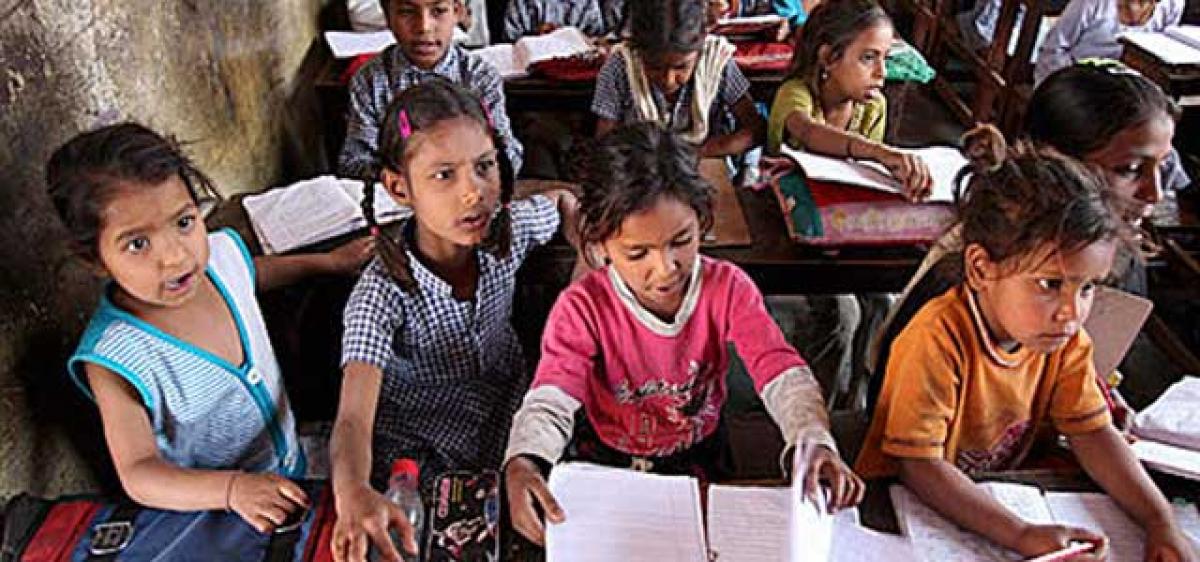Live
- Nazara Technologies sees Q2 profit decline 33 pc to Rs 16 crore
- Jan Aushadhi Kendras become a lifeline for the common man in Jharkhand's Dhanbad
- Rana Daggubati Unveils a Fresh Take on Celebrity Talk Shows with The Rana Daggubati Show
- Pakistan battles smog emergency as millions suffer from respiratory infections
- NASA's AI Earth Copilot: Answer Your Questions About the Planet
- Another tigress released in soft enclosure in Similipal
- Cong, BJP leaders’ rush to join AAP shows we are winning Assembly polls: Kejriwal
- Janajatiya Gaurav Diwas: PM Modi’s selfie with members of Irula tribe draws attention
- Bolivian Opposition leaders arrested on terrorism charges
- 1 in 5 IT decision-makers struggling to find AI/ML talent: Report
Just In

Education is the single most important factor in breaking the cycle of poverty. By receiving a quality education, children are empowered to reach their full potential and become healthy, happy, income-producing adults.
Education is the single most important factor in breaking the cycle of poverty. By receiving a quality education, children are empowered to reach their full potential and become healthy, happy, income-producing adults.
According to the World Bank, eight million children in India ages 6-14 were out of school in 2009. That same year, the Indian government took a historic step and passed the landmark Right of Children to Free and Compulsory Education Act.
For the first time in India’s history, every child in the country is guaranteed a free, quality elementary education. What’s more, the law focuses on keeping the education child-friendly and child-centered, promoting the holistic development of each child.
The passage of this law was an important first step in the right direction, toward the goal of every Indian child receiving a quality education, securing a good job, and becoming an independent, thriving global citizen.
The Right to Education for Children without Parents
At the Miracle Foundation, we bring life-changing care to orphans across India. Helping people help themselves is the most sustainable way to affect real change.
That’s why we give purposeful employment to local people in need of work and train existing children’s homes on how to provide better quality of care to children without parents.
Inspired by the 1989 United Nations Convention on the Rights of the Childand Maslow’s Hierarchy of Needs, Miracle Foundation created the 12 Rights of a Child, focusing specifically on the rights of children without parents. Every child has rights, and we at the Miracle Foundation work to ensure that even children without parents have the opportunity to realize them.
One of the 12 Rights of a Child is the Right to Education. To ensure each child we support receives a quality education, we work with children’s homes to provideschool uniforms and supplies, supplemental tutors and enrichment programs, aptitude testing and career counselling, and access to higher education and vocational training.
In addition, weguide children’s home staff on how to maintain active communication with teachers and train caregivers on how to track each child’s grades and progress in school. We also provide computer labs and libraries in the children’s homes we support—with the goal of making learning more fun and engaging, while providing children much-needed technology literacy.
We have definitive proof that our education interventions are working! One hundred percent of the children we support are enrolled in school, compared to India’s secondary school enrollment rate of 56% (USAID).
Ninety-eight percent of the children we support pass 10th standard, compared to India’s passing rate of 42% (Brookings Institute). And we support 174 children in higher education, who are studying subjects from social work to engineering.
Societal Benefits of Education
Educating orphans benefits not only the children themselves, but the communities in which they live. Children who receive a quality education are less likely to engage in crime or require social support from the government—minimizing societal costs.
This effect is magnified by the contributions of these children once they grow into well-educated adults: Orphans receiving a quality education get better jobs, earn more, pay more in taxes, and contribute to companies driving economic growth. (Amazingly, when Indian children learn English, they increase their lifetime earning potential four-fold!) This effect is generational, as individuals with more years of education are more likely to ensure their children receive a quality education as well.
Education is important to equip children with the skills needed to get a good job and become independent adults. But a quality education does so much more: A quality education forms children’s personalities, teaches them the importance of becoming an active and responsible citizen, and hones the communication and interpersonal skills needed to be a contributing member of society. Kids are the future of India—let’s make sure we’re investing in them now!
By: Caroline Boudreaux
(The writer is , Founder of Miracle Foundation)

© 2024 Hyderabad Media House Limited/The Hans India. All rights reserved. Powered by hocalwire.com







